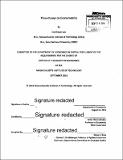Three essays on econometrics
Author(s)
Lee, Joonhwan
DownloadFull printable version (5.039Mb)
Other Contributors
Massachusetts Institute of Technology. Department of Economics.
Advisor
Victor Chernozhukov.
Terms of use
Metadata
Show full item recordAbstract
This thesis consists of three chapters that cover separate topics in econometrics. The first chapter demonstrate a negative result on the asymptotic sizes of subset Anderson- Rubin tests with weakly identified nuisance parameters and general covariance structure. The result of Guggenberger et al (2012) in case of homoskedasticity is shown to break down when general covariance structure is allowed. I provide a thorough simulation results to show that the break-down of the result can be observed in wide range of parameters that is plausible in empirical applications. The second chapter propose an inference procedure on Quasi-Bayesian estimators accounting for Monte-Carlo numerical errors. Quasi-Bayesian method have been applied to numerous applications to tackle the non-convex shape arises in certain extremum estimations. The method involves drawing finite number of Monte Carlo Markov chains to make inference and thus some degree of numerical error is inevitable. This chapter quantifies the degree of numerical error arising from the finite draws and provides a method to incorporate such errors into the final inference. I show that a sufficient condition for establishing correct numerical standard errors is geometric ergodicity of the MCMC chain. It is also shown that geometric ergodicity is satisfied under Metropolis Hastings chains with quasi-posterior for the whole class of extremum estimators. The third chapter considers fixed effects estimation and inference in nonlinear panel data models with random coefficients and endogenous regressors. The quantities of interest are estimated by cross sectional sample moments of generalized method of moments (GMM) estimators applied separately to the time series of each individual. To deal with the incidental parameter problem introduced by the noise of the within-individual estimators in short panels, we develop bias corrections. These corrections are based on higher-order asymptotic expansions of the GMM estimators and produce improved point and interval estimates in moderately long panels. Under asymptotic sequences where the cross sectional and time series dimensions of the panel pass to infinity at the same rate, the uncorrected estimators have asymptotic biases of the same order as their asymptotic standard deviations. The bias corrections remove the bias without increasing variance.
Description
Thesis: Ph. D., Massachusetts Institute of Technology, Department of Economics, 2014. Cataloged from PDF version of thesis. Includes bibliographical references.
Date issued
2014Department
Massachusetts Institute of Technology. Department of EconomicsPublisher
Massachusetts Institute of Technology
Keywords
Economics.